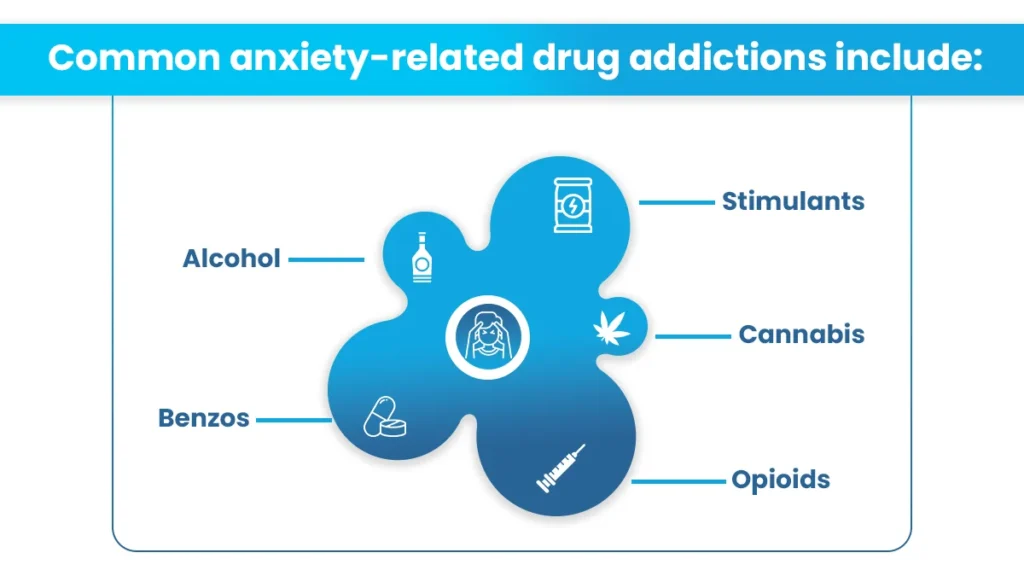Addiction and anxiety are two interconnected issues that affect many Americans today. Both are mental health conditions that can have significant impacts on individuals’ lives and well-being.
People with anxiety often turn to addictive substances to cope with their fears. At the same time, addiction can worsen anxiety and create a vicious cycle, making it even harder to break free.

Understanding the connection between both conditions is crucial for effective treatment and support. Seeking professional help and support can make a noteworthy difference in managing these challenges.
Key Takeaways
Addiction and anxiety are two serious issues affecting millions in the United States. Here is what you need to know about them:
- Anxiety and substance abuse disorders often coexist, creating a challenging and vicious cycle of self-medicating.
- Common anxiety-related drug addictions include alcohol, benzos, opioids, stimulants, and cannabis.
- The combination of addiction and anxiety can significantly impact physical, mental, emotional, and social well-being.
- Treatment options for addiction and anxiety include detox, inpatient treatment, psychotherapy, medication, and support groups.
If you need professional treatment, consider The Haven Detox-South Florida, where comprehensive care is available to guide you on your recovery journey. Contact us at (561) 328–8627 to get information about our treatment programs.
Understanding Anxiety
Anxiety is a feeling that everyone experiences at some point in their lives. It’s like a little voice inside you, making you worry about things, even when there’s no real danger. Imagine feeling nervous before a big test or an important presentation; that’s anxiety!
But for some people, anxiety can become overwhelming and persistent. It may interfere with their daily life and cause them distress. Imagine feeling anxious about going to school or work every day or worrying so much that you can’t sleep at night. When anxiety becomes problematic, it may be diagnosed as an anxiety disorder.
Anxiety disorders can take on different shapes, like generalized anxiety disorder (GAD), social anxiety disorder, or panic disorder. Each type has unique symptoms, but they all share that common thread of excessive worry and fear.
Understanding Drug Addiction
Drug addiction affects many people in the United States. It happens when someone becomes dependent on drugs, like alcohol, painkillers, or illegal substances. At first, people may try drugs out of curiosity or peer pressure, but over time, they can become addicted.
Addiction knows no boundaries, affecting individuals of all ages, genders, or backgrounds. When someone first tries a drug, it might make them feel good or help them forget their problems. But over time, their body and brain get used to the drug, and they need more of it to feel the same way. This phenomenon is called tolerance.
As someone keeps using the drug, their body can become physically dependent on it. If they try to stop, they might experience withdrawal symptoms, like feeling sick or anxious. This can make it hard for them to quit, even if they know the drug is causing problems.
The Cycle of Self-Medication: Anxiety and Drug Abuse
Anxiety and substance abuse are two puzzle pieces that can fit together, forming a troubling cycle known as self-medication. When people experience anxiety, they might feel overwhelmed by worry, fear, or unease. It’s tough to deal with these feelings; some may turn to substances like alcohol or drugs to cope.
At first, using these substances might seem to help. They can make a person feel calmer or numb the anxiety temporarily. It’s like a quick fix that offers relief. However, the relief is short-lived, and soon the anxiety comes back, often even stronger than before.
As anxiety continues to haunt the person, they might use more substances, thinking it will keep the anxiety at bay. But the more they use, the more their body and mind become dependent on those substances. Addiction sets in, and now they have two problems – anxiety and substance dependence.
Breaking the cycle of self-medication and addressing anxiety in a healthy way is crucial. It starts with recognizing the problem and seeking help. The first step is to talk to someone you trust, like a family member or close friend. They may offer emotional support and encouragement.
Professional help is vital too. A therapist or counselor can teach effective coping strategies for managing anxiety symptoms. They can help identify triggers and work on healthier ways to cope with stress and worries.
Exploring the Link: Anxiety and Common Drug Addictions
Anxiety can sometimes lead people to use drugs to cope with overwhelming feelings. While not everyone with anxiety will develop a drug addiction, certain types of addiction are more commonly associated with anxiety. Here are some of them:
Alcohol Addiction
Many people with anxiety may turn to alcohol to temporarily relieve their symptoms. Alcohol can initially create a sense of relaxation and calm, but it often worsens anxiety in the long run, leading to alcohol dependence. It’s a dangerous cycle where people may rely on alcohol to escape their anxiety, but it ultimately deepens their emotional distress.
Benzodiazepine Addiction
Benzos are a class of prescription medications used to treat anxiety disorders. While effective for short-term relief, they can be habit-forming and lead to addiction. People may misuse these medications, taking them in higher doses or more frequently than prescribed, leading to dependency.
Opioid Addiction
Opioids, like prescription painkillers or illicit drugs such as heroin, can temporarily escape anxiety. They can create a sense of euphoria and numbness, masking emotional pain. However, opioid use quickly leads to tolerance and physical dependence, making it challenging to stop without professional help.
Marijuana Addiction
Some individuals use marijuana to self-medicate anxiety symptoms, which can induce relaxation. However, frequent use can lead to dependence and worsen anxiety in the long term. It’s essential to recognize that marijuana is not a suitable long-term solution for managing anxiety.
Stimulant Addiction
Stimulant drugs, like cocaine or meth, can temporarily boost energy and increase confidence. People with anxiety may misuse these drugs to counteract their feelings of nervousness and fear. However, stimulant use can lead to heightened anxiety, paranoia, and other mental health issues.
From Coping to Chaos: The Toll of Addiction and Anxiety
Addiction and anxiety, when experienced together, can significantly impact a person’s life, affecting them physically, mentally, emotionally, and socially. Let’s explore these impacts in detail:
Physical Impact
Physically, the combination of addiction and anxiety can take a severe toll on the body. Substance use and abuse, such as drugs or alcohol, can lead to health problems, while anxiety can cause physical symptoms like headaches and stomachaches. Neglecting self-care due to addiction can exacerbate anxiety, creating a harmful cycle.
Mental Impact
Mentally, the co-occurrence of these conditions can be overwhelming. Addiction alters brain chemistry, leading to compulsive behavior, while anxiety can make a person constantly on edge and irritable. Together, they heighten stress and can lead to a sense of hopelessness.
Emotional Impact
Emotionally, the impact can be profound. A person might feel trapped and unable to break free from the addiction while being consumed by constant feelings of worry and fear caused by anxiety. They may experience mood swings, guilt, and shame, leading to low self-esteem.
Social Impact
Addiction and anxiety can isolate individuals from their support networks. The stigma surrounding addiction may prevent them from seeking help, and anxiety can hinder social interactions and make them withdraw from others. As a result, they may lose relationships and struggle to build new ones.
Finding Calm in Chaos: Combating Addiction and Anxiety
Dealing with addiction and anxiety can be tough, but many effective methods exist to overcome these challenges. Let’s explore some key approaches to help people regain control of their lives and find the path to recovery and well-being.
Detox
Detox, or detoxification, is the first step for many people struggling with substance use disorder (SUD). It helps remove harmful substances from the body, making it easier to start the addiction recovery process. During medical detox, medical professionals provide support and monitoring to ensure safety and comfort as the body adjusts to being without the addictive substances.
Inpatient Treatment
Inpatient treatment involves staying at a specialized facility with 24/7 care and support. This treatment is especially beneficial for those with severe anxiety or addiction issues. In a structured environment, you’ll have access to therapy, counseling, and other resources to address the root causes of drug addiction and anxiety.
Psychotherapy
Psychotherapy, or talk therapy, is a cornerstone of addiction and anxiety treatment. During psychotherapy sessions, therapists help individuals identify the underlying causes of their addiction or anxiety, develop coping mechanisms, and learn healthier ways to deal with stress and triggers.
Different approaches, such as cognitive-behavioral therapy (CBT) and eye movement desensitization and reprocessing (EMDR), cater to each patient’s individual needs.
Medication
Medications can help manage both addiction and anxiety. For addiction, drugs like methadone, buprenorphine, or naltrexone are used to reduce cravings and dependence on opioids or alcohol. Medications for anxiety may include selective serotonin reuptake inhibitors (SSRIs) like sertraline or escitalopram, which help regulate mood and anxiety levels.
Support Groups
Joining local support groups can be highly beneficial for individuals facing addiction and anxiety. In these groups, you’ll meet others with similar experiences, and you can share your journey and learn from one another. Support groups can be specific to certain addictions or mental illnesses, such as Alcoholics Anonymous (AA) or Anxiety and Depression Association of America (ADAA) support groups.
Frequently Asked Questions (FAQ)
How does addiction cause anxiety?
Addiction can cause anxiety by disrupting brain chemistry and triggering changes in the brain’s reward system. The constant need for drugs or alcohol can increase stress, fear, and worry. It creates a cycle where anxiety may drive individuals to seek substances for temporary relief, further deepening the addiction.
Is there a link between anxiety and addiction?
Yes, there is a strong link between anxiety and addiction. A lot of people with anxiety turn to addictive substances or behaviors as a way to cope with their distressing feelings. However, addiction can worsen anxiety over time, leading to a harmful cycle of dependence and heightened anxiety levels.
What are the four coping skills for anxiety?
The four coping skills for anxiety are:
Deep Breathing: Practice slow and deep breathing to calm the nervous system.
Progressive Muscle Relaxation: Tense and relax different muscle groups to reduce physical tension.
Mindfulness: Stay present and focus on the current moment to avoid excessive worrying.
Positive Self-Talk: Replace negative thoughts with positive and reassuring affirmations.
What are the signs and symptoms of addiction related to anxiety?
Signs and symptoms of addiction related to anxiety may include:
Increased drug and alcohol abuse to cope with symptoms of anxiety.
Feeling the loss of ability to function without relying on substances.
Neglecting responsibilities and relationships due to addiction and anxiety.
Experiencing withdrawal symptoms when attempting to stop drugs.
The Haven Detox-South Florida: Rekindling Hope
Are anxiety and addiction holding you back from the life you deserve? Don’t face this journey alone – The Haven Detox-South Florida is here to help you reclaim your happiness and well-being!
Starting with a medical detox program, we help your body eliminate harmful toxins and pave the way for a fresh start. Our residential treatment offers intensive care and a safe space to address addiction and anxiety. Experience the benefits of our IV therapy, replenishing your body with essential nutrients for improved well-being.
Don’t wait any longer – take the first step towards a brighter future today! Contact us at (561) 328–8627 for the compassionate and comprehensive care you need.






